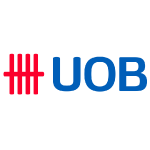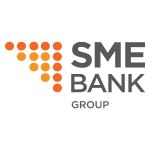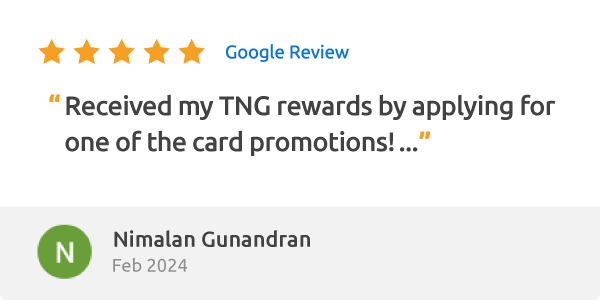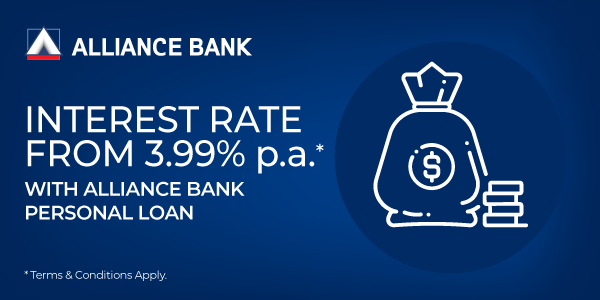Business Loans in Malaysia
Previously ranked 12th in the World Bank’s Doing Business Report, Malaysia thrives as one of the most booming business and investment hubs in Southeast Asia.
The said report highlights our ease of doing business which includes business incorporation, getting building permits, gaining electricity connections, etc as a catalyst for business expansion.
Despite the positive world recognition, local startups are finding it difficult to fund their businesses, especially when there is no proper business plan.
But before we get into the business loan or financing part, here’s how you start a business in Malaysia.
Have a business plan
A proper business plan is crucial, no matter what type of business you are planning to do as it helps you to understand the current market situation and get to know what other businesses are doing.
You can start by researching the market to identify your potential competitors, trends, and risks. From there, you can envision your business objectives, manage future challenges, and mitigate any risks to sustain your business.
Review your financial projections
A financial projection is a prediction of future revenues and expenses of your business. Once you have reviewed the projection, it allows you to translate your business goals into specific targets moving forward.
Hence, it is good for you to start with a marketing budget in which you can estimate the total cost to market your products or services.
Decide your business entity
There are several business entities and each has its own compliance requirements, tax structure, etc. Here are five common business entities in Malaysia:
1. Sole Proprietorship
A business entity that is wholly owned by a Malaysian or permanent resident without a legal entity such as a corporation etc.
2. Limited Liability Partnership (LLP)
A business entity that is a combination of characteristics between a partnership and a private limited company (Sdn. Bhd).
3. Partnership
A business entity with an arrangement between two or more individuals that carry on and share the profits or liabilities of a business.
4. Public Limited Company / Berhad
A business entity with its shares that can be offered to the public commonly has two shareholders and more than fifty members in one company. It is also governed by the Securities Commission of Malaysia and is often listed.
5. Private Limited Company / Sendirian Berhad
A business entity of separate legal establishment in which the company alone can acquire property, undertake legal agreements, sue or get sued by law.
Decide a business name
Every successful business is more than just a brand name - it helps to convey the key elements of your business. The name should match the services you are offering.
Firstly, you can do a name search. Once you have decided on your business name, you are required to officiate it. Here are some steps you can follow to formalise your company:
- Fill in Form 13A which is the “Request For Availability Of Name” form and submit it to Suruhanjaya Syarikat Malaysia (SSM)
- Pay an RM30 fee for each name applied
- Register your business name with SSM to get approval from the Company Formation in Malaysia
Explore your business location
A good business location serves as a part of your business marketing strategy too. It can be anywhere within the country, even near your home.
Register an office address
After finding out the best location for your business, you can proceed to register a local office address within 14 days after your business inception. You can inform SSM by submitting Form 44.
Prepare incorporation documents
Before starting a business, these documents are required for your company startup:
- Memorandum and Article of Association/Constitution
- Statutory Declaration by a director or promoter before an appointment
- Declaration of Compliance
- A copy of the company name’s approval letter by SSM
- A copy of the identification card (IC) of each director and company secretary
Company incorporation
Once the documents are in place and ready, you can submit them to SSM within 3 months from the approval date of your business name. In case you have exceeded the due date, you will need to reapply for a new name search.
Pay registration fees
There are several fees that you will need to pay upon your company’s registration.
Issuance of Certificate of Registration
After the registration fee transaction has been made, you will receive your new Business Registration Certificate within one hour. Congratulations, you are a business owner!
Now that you have an idea of how to start a business in Malaysia, let’s dive into the business loan part as we lay out the definition of a business loan, the purpose of applying, the type of business loans in Malaysia, where you can apply and what are the requirements.
What is a business loan?
A business loan is a niche financial product, tailored for business owners. You may think it is as straightforward as applying for a personal loan, but it is not.
When first starting a business, you need capital to fund its inception, capital expenses, operational expenses, suppliers and many more. Some business owners have strong financial backups, where capital can be easily pumped from investors, own assets and savings. During this stage, a business loan is not an option.
As your business expands, you need more money to meet the increasing supply and demand. Instead of tapping into your financial reserves or private entities for more funding, you can apply for a loan to finance your working capital. This way, you can keep your savings and profits at bay.
There are terms described in business loans that may find you scratching your head, but fret not. Here are some of the terms and their definitions:
| Terms | Descriptions |
|
Sales turnover or revenue |
The total sales made in a certain period. Also sometimes referred to as “gross revenue” or “income”. It is an important measure of a company’s performance. |
|
Working capital |
It counts as money that’s available to a company for its daily operations. |
|
National ownership |
In which a company or business is owned by a certain percentage of local residents. |
|
Bumiputera ownership |
In which a company or business is owned by mostly ethnic Malays. |
|
Venture capital |
Big institutions invest their capital to fund startup companies with high growth potential in exchange for an equity stake. |
|
Angel investor |
Usually, a high net-worth individual who funds startups at the early stages with their own money, typically in exchange for ownership equity in the company. |
Is taking a business loan a good idea?
Running a business has its ups and downs. To reap a favourable return, there is always a risk to manage. Taking out a loan from a bank is an alternative you can avail yourself of when your business is doing well or on the verge of collapse.
If your cash flow is properly managed, applying for a business loan is practical for these reasons:
- To expand operations
- To purchase equipment
- To purchase inventory
- To increase working capital
How many types of business loans are in the market?
Overdraft
An overdraft is the most common business loan for SMEs to apply for. For this loan, you will be able to withdraw in excess of your current account balance to an approved limit.
Term Loan
If you wish to take up asset acquisition, then you can consider applying for a term loan. The loan will be granted for a period of time and shall be repaid in monthly instalments.
Bridging Loan
This type of loan is more flexible towards meeting business needs and the owner’s cash flow requirements. It is usually granted for housing or mixed-development projects.
Fixed Loan
Quite similar to the term loan, a fixed loan is granted for an agreed period of time with periodic payments that include interest charges.
Revolving Credit
This is suitable for short-term working capital funding. It allows flexible withdrawal of funds whenever required and you can pay back by choosing either monthly instalments and rollover of the principal amount or partial repayment of the principal amount.
Blanket Hire-Purchase
This is a type of financing that you can borrow for hire-purchase of commercial equipment and vehicles. The principal amount and the repayment schedule are usually fixed.
End-Financing
Property developers usually will utilise this business loan to enable the developed shops or houses to be sold to purchasers. Interestingly, the funding is also almost automatically given to the purchaser of a new property under this facility.
Financial Guarantee
In an event of default or non-performance, this financing offers a financial guarantee which includes a performance guarantee, security deposit guarantee, advance payment guarantee and financial guarantees issued to insurance companies.
What are the main sources of business funding in Malaysia?
In Malaysia, commercial and industrial banks are the main providers of business loans. However, these entities are highly regulated by the Bank Negara Malaysia (BNM) and are known for imposing strict lending requirements.
Apart from the banks, you will also find a number of financial services providers that are offering business loans such as venture capital and government agencies.
Development Financial Institutions (DFI) are financial services providers that are backed by the government and offer targeted financial assistance to Micro Enterprises and SMEs.
Development Financial Institutions (DFI)
- Bank Rakyat
- Bank Pembangunan Malaysia Berhad
- Agrobank
- SME Bank
- BSN
- EXIM Bank
Government Funding/Grants
- Soft Loan Schemes for Services Sectors
- Soft Loan for SMEs
- Tabung Usahawan Siswazah (TUS)
- Young Entrepreneur Fund (YEF)
- Tabung Pembangunan Pengangkutan Awam
- Bumiputera Enterprise Enhancement Programme
- SME Emergency Fund
- Business Start-Up Fund (BSF)
- TEKUN Financing
- Skim Kredit Pengeluaran Makanan (SKPM)
- Rural Economy Funding Scheme (SPED)
- PROSPER Usahawan Muda (PUMA)
Who can apply for a business loan?
There are 3 important aspects that you need to know before making your business loan application in Malaysia:
Company’s years of operation
To qualify for a business loan application, it is important that you own a company that has been operating for at least 1 to 2 years with proper documentation and records.
Official business classification
According to SME Corp, a government agency under the Ministry of Entrepreneur Development and Cooperatives, a business is deemed an SME if it meets the following criteria:
| Sector | Micro SMEs | Small SMEs | Medium SMEs |
|
Manufacturing |
Sales turnover < RM300,000 Full-time employees < 5 |
Sales turnover < RM15 million Full-time employees < 75 |
Sales turnover < RM50 million Full-time employees < 200 |
|
Services & Others |
Sales turnover < RM300,000 Full-time employees < 5 |
Sales turnover < RM3 million Full-time employees < 30 |
Sales turnover < RM20 million Full-time employees < 75 |
National Ownership
A company that wants to operate and trade in Malaysia must be locally incorporated, with its shareholders must be majority owned by the national citizen(s) (>51%).
How can I apply for a business loan?
Applying for a business loan requires you to prepare comprehensive documentation of your company’s activities and financial situation.
Based on the type of your business, these commonly required documents (which are not exhaustive) will go into your application and will be processed according to the bank’s assessment criteria.
How much can I borrow?
The loan amount you can borrow for capital financing can range from thousands to millions of Ringgit, depending on your company’s size, annual turnover, business classification and the bank’s assessment criteria.
For example, a Micro SME with a sales turnover of a maximum of RM300,000 will usually be offered up to RM100,000 financing.
Once the loan amount is agreed upon, your financing will then be assigned with an interest rate that best matches your business risk profile; a higher risk is equal to a higher interest rate, and vice versa.
Do I need a guarantor or collateral?
Typically, a bank will require you to provide a guarantor in the form of a shareholder’s guarantee, provided that your company’s financial standing is not satisfactory.
It is a personal liability by the shareholder to indemnify a lender over an outstanding debt should the business run into financial difficulty.
But there are growing numbers of banks offering unsecuritised business loans for micro and SME businesses that are subjected to the bank’s terms and conditions.
Depending on the purpose of your application, you may or may not require standby collateral for business financing.
Best Business Loans in Malaysia
| Financial Services Providers | Products |
|
Commercial Bank |
|
|
Financial Services Company |
|
|
Development Financial Institution |
|
|
Islamic Bank |
You can also navigate to our online business loan page to compare and apply for the best loan for your next business venture.




























